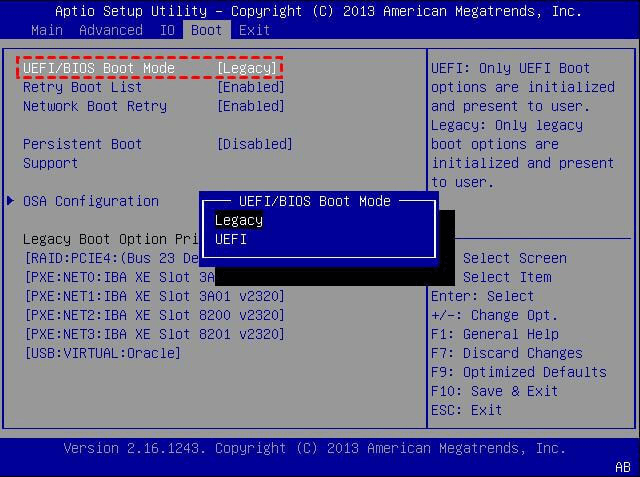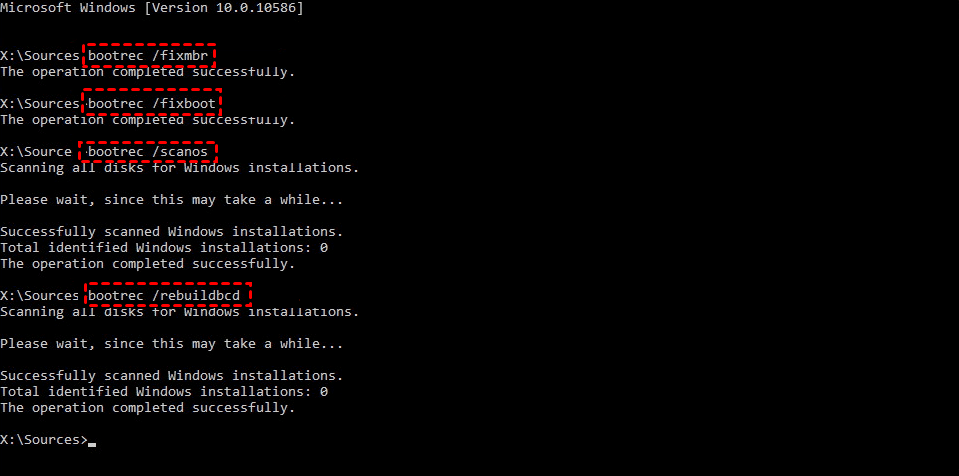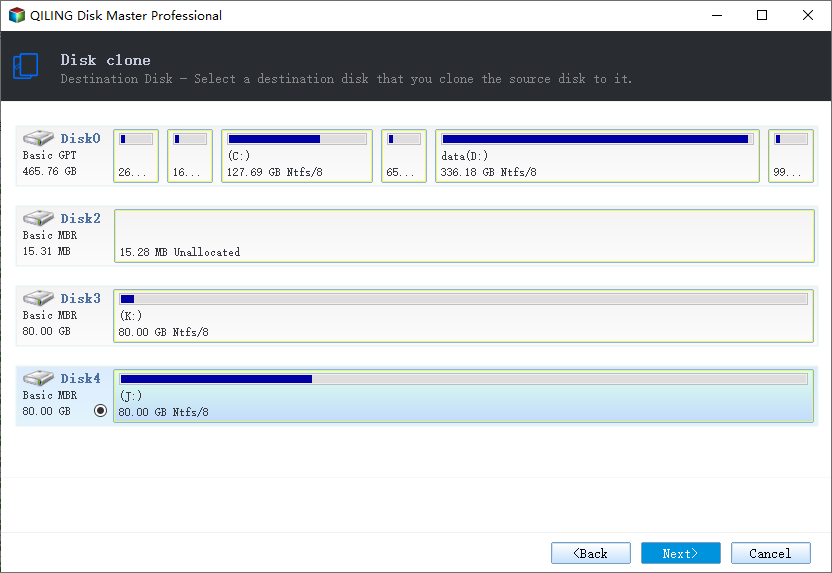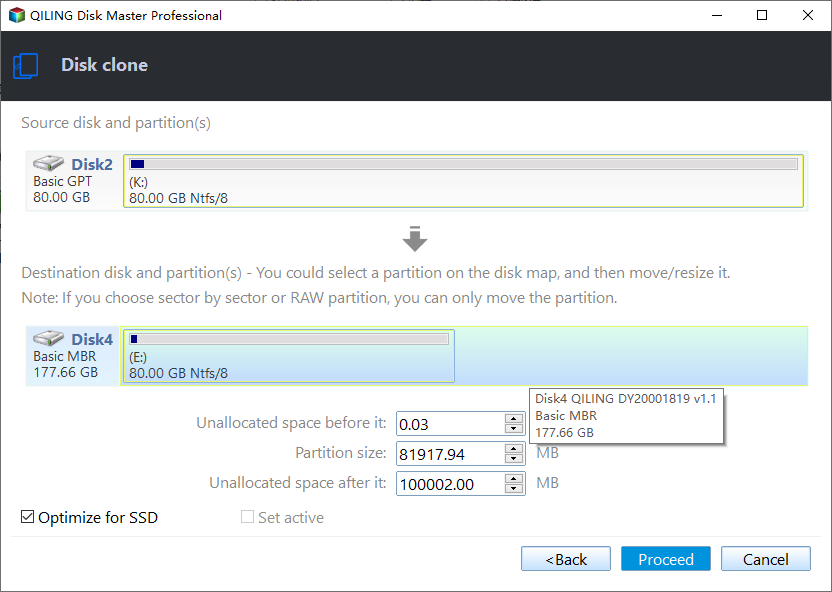How to Make Cloned Drive Bootable in Windows 11/10 [5 Tips]
- Problem: Cloned drive won’t boot in Windows 10
- Why cloned SSD won’t boot
- How to make cloned drive bootable in Windows 10/11
- Way 1. Change boot order to boot from the cloned SSD
- Way 3. Remove/wipe the previous drive
- Way 4. Fix corrupted BCD
- Way 5. Restart the cloning process in an error-free way
- Conclusion
Problem: Cloned drive won’t boot in Windows 10
Sometimes we may clone hard drive to SSD for better performance, clone smaller drive to larger drive for more capacity, or clone internal drive to external as a backup. However, the issue that cloned drive won’t boot occurs in Windows 11/10/8/7 every now and then. Here is a live example from forum:
I bought a SSD with the intent of cloning my HDD, and after some trial and error, got the process completed. Through the USB to SATA cable, the computer is recognizing the new drive and all the data. But when I swapped the drives, the BIOS says it can't boot because there's no hard drive.
What are the possible causes of this problem and how can we make cloned SSD bootable?
Why cloned SSD won’t boot
What causes your cloned drive not to boot? Here I have summarized some common reasons:
- The cloned drive is not set as the first boot option.
- The boot mode isn't compatible with the cloned GPT/MBR disk.
- The unique SID (system identification number) has been cloned to the target disk as well.
- The boot configuration data (BCD) got corrupted during migration.
- Other errors during cloning, such as the bad sectors on the source drive being migrated to the target drive.
How to make cloned drive bootable in Windows 10/11
Given the possible causes of cloned drive won't boot issue, the corresponding solutions are also provided below. But before anything, it's best to make sure that the cloning process was successful and error-free.
Sometimes, cloning tools may miss copying the boot sector or the necessary partition information. Make sure that the boot sector and relevant partitions were properly cloned.
Perform a complete and successful system & data clone to ensure that your target disk is bootable. Details »
Next, I will introduce some common methods to make sure the computer can boot from the cloned drive.
Way 1. Change boot order to boot from the cloned SSD
If there are more than one hard drive on your computer, when you boot failed, you need to consider whether it is wrong of your boot device.
If it is, you need to press the specific key (usually F2, F8, F12,Del) to enter BIOS or UEFI settings, and change the boot order to boot from the cloned SSD.
Way 2. Switch BIOS mode to UEFI (GPT) or Legacy (MBR)
One thing to be noted is that MBR disk works with Legacy BIOS while GPT disk works with UEFI. So if you need to clone a MBR HDD to GPT SSD, or vice versa, it is necessary to switch the boot mode accordingly. The wrong boot mode will cause the SSD not booting after clone.
To change the boot mode, you need to enter BIOS during startup as well, then select the boot mode (usually under Boot tab) as Legacy or UEFI.
*If your computer only supports Legacy BIOS mode, you can convert GPT to MBR to make it compatible.
Way 3. Remove/wipe the previous drive
Many cloning software have their own SID (System Identifier) generation utilities, but there are some exceptions. If the software copies the drive’s unique SID as well, it may end up confusing the system, since it won’t know where to boot from.
In this case, you can make only one of the drives usable by removing or wiping the original drive.
Way 4. Fix corrupted BCD
If the cloned drive fails to boot because of corrupted BCD, you can access Windows recovery environment, and use Startup Repair (Advanced options > Troubleshoot > Advanced Options) to fix it, or run bootrec.exe commands in Command Prompt to rebuild BCD:
Bootrec /fixmbr
Bootrec /fixboot
Bootrec /scanos
Bootrec /rebuildbcd
Way 5. Restart the cloning process in an error-free way
If you have encountered errors during the cloning process, you can either choose to fix the error, or restart the cloning process with professional cloning tools.
There are also some considerations before, during and after the cloning process that can help you avoid the unbootable situation. I will give you more details below.
Cloning Windows 10 boot drive with reliable software
It is highly recommended that you use the best disk cloning software - Qiling Disk Master Professional which allows you to clone HDD to SSD with simple steps. And it can make SSD bootable after clone in Windows 10 successfully.
Qiling Disk Master is a reliable software that can clone Windows 11/10/8/7/etc boot drive safely and efficiently. It runs in an intelligent mode by default, which skips bad sectors and unused sectors during cloning.
In this way, we can certainly enjoy a better cloning speed and avoid many potential booting problems. And things will become much easier to clone larger drive to smaller drive or vice versa.
Steps of Windows 10 cloning boot drive
▪ The target disk will be overwritten after cloning, so it's recommended to perform data backup in advance.
▪ The Professional edition supports data disks and system disksof all brands and partition styles. You can clone MBR to MBR/MBR to GPT or GPT to GPT/GPT to MBR directly. But you still need to make sure the partition style of the target disk is compatible with the boot mode.
Step 1. Connect the SSD to your computer and make sure it can be detected. Then download Qiling Disk Master, install and launch it.
*Clone features in free trial can only be demonstrated. Please upgrade for full functionality.
Step 2. Click Disk Clone under the Clone tab. If you want to clone operating system only, select System Clone instead.
Step 3. Select the HDD as the source disk and click Next.
Step 4. Select SSD as the destination disk.
Step 5. Tick the SSD Alignment option to accelerate the reading and writing speed of the SSD. And click Proceed.
🚀Other useful options:
- Sector By Sector Clone: It allows you to clone all sectors on source disk no matter they are used or not. If you are cloning a large hard drive to a smaller SSD, better not to choose it. But if you are trying to clone the system reserved partition, please tick it to make sure it functions normally on the cloned drive.
- SSD Alignment: If your target drive is an SSD, you can tick this option to accelerate its write & read speed and prolong its life span.
- System Clone: If you want to clone only operating system to target drive, e.g. clone Windows 10 to NVMe SSD, you can use this option.
- Edit Partitions: When cloning a small disk to a larger disk, you can choose “Add unused space to all partitions”or “Manually adjust partition size” to use full capacity of the larger disk.
Conclusion
If you encounter similar issues, you can try the above methods to fix them and make cloned drive bootable in Windows 10. And if you want to avoid the booting problems, Qiling Disk Master, the best disk cloning software, can help you clone hard drive easily and error-free. Given the excellent compatibility, you can also use it as a M.2 SSD cloner to migrate Windows 10 to M.2 SSD.
Apart from the clone feature, Qiling Disk Master owns the backup and restore features. Keep it installed after cloning and set continuous data protection for your computer.
Related Articles
- Create Windows 10 Bootable Clone (with Video)
You will learn the best way to create a bootable clone of Windows 10 or 11 and boot from it successfully. You don't need to reinstall Windows. - Best Bootable Hard Disk Clone Software for Windows 10/8/7
This article is written for users like you who want to clone boot drive with bootable disk clone software in Windows when system fails to boot. - How to Clone SSD to HDD in Windows 10 (Secure Boot)?
Looking for a way to copy SSD to HDD in Windows 10/11? This page shows a simple way to migrate data from SSD to HDD. - Perform a Bootable Clone on Windows 11- No Data Loss
This page explains how easy it is to perform a bootable clone on Windows 11 without losing any data. Continue reading for details on how to migrate your system and data.








